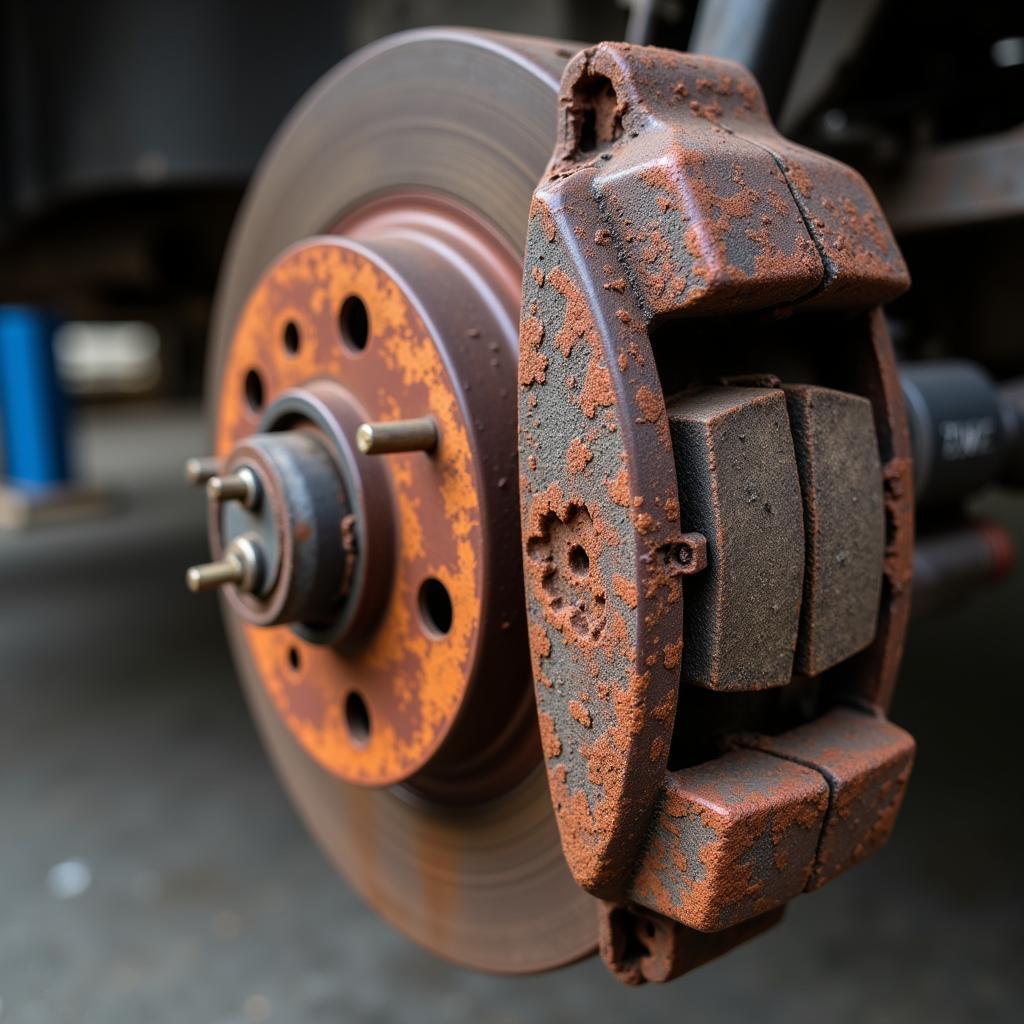Overheating is a common and serious car problem. Understanding the Possible Car Overheating Problems is crucial for every car owner, mechanic, and automotive technician. This guide will delve into the various causes, symptoms, and solutions to address these issues effectively.
A car’s cooling system is designed to regulate engine temperature and prevent overheating. When this system malfunctions, various problems can arise, ranging from minor inconveniences to major engine damage. If your car is overheating, don’t ignore it. Prompt diagnosis and repair are essential to avoid costly repairs. car overheat problem
Common Causes of Car Overheating
Low Coolant Level
One of the most frequent possible car overheating problems is a low coolant level. Coolant, a mixture of antifreeze and water, absorbs heat from the engine and dissipates it through the radiator. If the coolant level is insufficient, the engine won’t be cooled effectively, leading to overheating. This can be caused by leaks, evaporation, or simply forgetting to top it off. Regularly checking your coolant level is a simple yet vital preventative measure.
Faulty Thermostat
The thermostat regulates the flow of coolant through the engine. A stuck closed thermostat restricts coolant flow, causing the engine to overheat. Conversely, a stuck open thermostat can prevent the engine from reaching its optimal operating temperature, impacting performance and fuel efficiency.
Radiator Issues
The radiator is responsible for cooling the hot coolant. A clogged radiator, due to debris or rust, restricts airflow and hinders heat dissipation. Damaged radiator fins or leaks can also contribute to overheating. my car is overheating what is the problem
Cooling Fan Malfunction
The cooling fan draws air through the radiator to cool the coolant. A malfunctioning fan, whether due to a faulty motor, relay, or sensor, can drastically reduce cooling efficiency, particularly at low speeds or when idling.
Water Pump Failure
The water pump circulates coolant throughout the engine. A failing water pump, often indicated by leaks or strange noises, disrupts coolant circulation and can lead to rapid overheating.
Diagnosing Car Overheating Problems
Identifying the source of your car’s overheating issue requires a systematic approach.
- Check the Temperature Gauge: The first sign of overheating is usually a high reading on the temperature gauge.
- Inspect for Leaks: Look for coolant leaks under the car or around the engine compartment.
- Check the Coolant Level: Ensure the coolant level is within the recommended range.
- Examine the Radiator: Check for clogs, leaks, or damaged fins.
- Test the Thermostat: A mechanic can test the thermostat to ensure it’s functioning correctly.
- Inspect the Cooling Fan: Observe the fan’s operation to determine if it’s engaging when necessary.
- Check the Water Pump: Look for leaks or unusual noises from the water pump.
“A thorough diagnosis is key to effectively addressing overheating,” says automotive expert, Michael Stevenson, ASE Certified Master Technician. “Ignoring early signs can lead to catastrophic engine failure.”
Solutions for Overheating Problems
Addressing overheating often involves repairing or replacing the faulty component. This may include:
- Topping off coolant: A simple solution for low coolant levels.
- Replacing the thermostat: A relatively inexpensive fix for a faulty thermostat.
- Flushing and cleaning the radiator: This can remove clogs and improve cooling efficiency.
- Repairing or replacing the radiator: Necessary for damaged radiators or persistent leaks.
- Replacing the cooling fan: Essential for a malfunctioning fan.
- Replacing the water pump: Crucial for a failing water pump.
Why is my car overheating?
Your car might be overheating due to a variety of reasons including low coolant, a faulty thermostat, a clogged radiator, a malfunctioning cooling fan, or a failing water pump.
How to Prevent Overheating
Regular maintenance can help prevent possible car overheating problems. This includes:
- Regular coolant flushes and changes
- Inspecting hoses and belts for wear and tear
- Checking the thermostat and water pump functionality
- Keeping the radiator clean and free of debris
“Preventative maintenance is the best way to avoid overheating and protect your engine,” advises Sarah Chen, automotive engineer. “Regular checks can save you time and money in the long run.” car indicator problems Don’t forget to also check your car’s other systems like the indicators, to ensure overall vehicle health. Sometimes, seemingly unrelated issues, like car subwoofer problems, can indirectly contribute to electrical problems, which can impact your car’s cooling system.
Conclusion
Understanding possible car overheating problems is crucial for maintaining your vehicle’s health and avoiding costly repairs. By being aware of the common causes, symptoms, and solutions, you can address these issues promptly and effectively. 1997 lincoln town car transmission problems If you’re experiencing persistent overheating issues, or if you’re not comfortable performing repairs yourself, seek professional assistance from a qualified mechanic. Feel free to connect with us at AutoTipPro for any assistance. Our phone number is +1 (641) 206-8880 and our office is located at 500 N St Mary’s St, San Antonio, TX 78205, United States.
FAQ
- What is the most common cause of car overheating? Low coolant is often the culprit.
- Can I drive my car if it’s overheating? No, it’s unsafe and can cause severe engine damage.
- How often should I check my coolant level? At least once a month.
- How much does it cost to fix an overheating problem? The cost varies depending on the cause and the necessary repairs.
- How can I prevent my car from overheating? Regular maintenance is key, including coolant flushes, hose inspections, and checking the thermostat and water pump.
- What are the signs of a bad water pump? Leaks, unusual noises, and overheating are common signs.
- What happens if I ignore an overheating problem? Ignoring overheating can lead to serious engine damage, including a cracked engine block or head gasket failure.





Leave a Reply